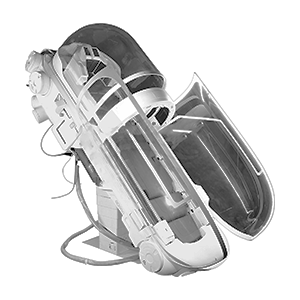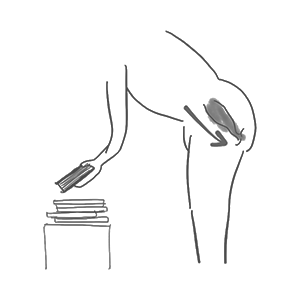According to a false conspiracy theory, medbeds (an abbreviation of ‘medical bed’ or ‘meditation bed’) are secret beds that can miraculously heal humans and extend life. The plausibility of such devices is pseudoscience. Medbed conspiracy theories often involve claims that the devices are utilized by members of a ‘deep state’ and billionaires and that the former President of the United States, John F. Kennedy, is still alive, lying on a medbed.
Belief in these devices is popular among QAnon influencers such as Michael Protzman, Romana Didulo, and YamatoQ. Various companies sell devices or access to beds that supposedly heal ailments via imaginary technologies while also including fine print on their websites disclaiming that no diagnoses, treatment, or cures are provided.
Medbed
Participation Trophy
A participation trophy is a trophy given to children (usually) who participate in any sport event or contest without requiring their success in competition. The term may be used more generally as an example of the celebration of mediocrity or of emotional coddling. In this rhetorical context, it is frequently associated with millennials, those of Generation Y.
The use of participation trophies has caused some controversy. Critics argue that they promote narcissism and entitlement among children to whom they are given, and are based on incorrect assumptions regarding supposed psychological benefits of self-esteem. Critics also note that some children also do not value them as much as they do ‘normal’ trophies that are given to winners. Defenders of participation trophies argue that they teach children that trying their best is good enough, even if they do not win.
read more »
Everesting
Everesting is an activity in which cyclists or runners ascend and descend a given hill multiple times, in order to have cumulatively climbed 8,848 meters (29,029 ft) (the elevation of Mount Everest).
The first event described as ‘Everesting’ was by George Mallory, grandson of George Mallory, who disappeared on Everest in 1924. The younger Mallory ascended Mount Donna Buang in 1994, having ridden eight ‘laps’ of the 1,069-meter hill. The format and rules were cemented by cyclist Andy van Bergen, inspired by the story of Mallory’s effort. In the first official group effort, van Bergen organized 65 riders, 40 of whom finished the Everesting attempt.
read more »
Shit Life Syndrome
Shit life syndrome (SLS) is a phrase used by physicians to describe the effect that a variety of poverty or abuse-induced disorders can have on patients.
Journalist Sarah O’Connor’s 2018 article for the ‘Financial Times’ ‘Left behind: can anyone save the towns the economy forgot?’ on shit life syndrome in the English coastal town of Blackpool won the 2018 Orwell Prize for Exposing Britain’s Social Evils. O’Connor wrote: ‘Blackpool exports healthy skilled people and imports the unskilled, the unemployed, and the unwell. As people overlooked by the modern economy wash up in a place that has also been left behind, the result is a quietly unfolding health crisis.”
read more »
Terminal Lucidity
Terminal lucidity, also known as ‘rallying’ or ‘the rally,’ is an unexpected return of mental clarity and memory, or suddenly regained consciousness that occurs in the time shortly before death in patients suffering from severe psychiatric or neurological disorders. This condition has been reported by physicians since the 19th century.
Several case reports in the 19th century described the unusual condition of an improvement and recovery of the mental state in patients days or weeks before death. English physician William Munk, for instance, in 1887 called the phenomenon ‘lucidity before death.’
read more »
Fugu
Fugu [foo-goo] is a pufferfish or porcupinefish dish originating in Japan. Fugu can be lethally poisonous to humans due to its tetrodotoxin, meaning it must be carefully prepared to remove toxic parts and to avoid contaminating the meat.
The restaurant preparation of fugu is strictly controlled by law in Japan and several other countries, and only chefs who have qualified after three or more years of rigorous training are allowed to prepare the fish. Domestic preparation occasionally leads to accidental death.
read more »
Spoon Theory
Spoon theory is a metaphor that is used to describe the amount of mental or physical energy a person has available for daily activities and tasks. The theory was developed by author Christine Miserandino in 2003 as a way to express how it felt to have lupus. She used spoons to provide a visual representation of units of energy that a person might have and how chronic illness forces her to plan out her days and actions in advance, so as not to run out of energy, or spoons, before the end of the day.
Those with chronic illness or pain have reported feelings of difference and division between themselves and people without disabilities. This theory and the claiming of the term ‘spoonie’ is utilized to build communities for those with chronic illness that can support each other.
read more »
Vestibular Rehabilitation
Vestibular [ve-stib-yuh-ler] rehabilitation (VR), also known as vestibular rehabilitation therapy (VRT), is a specialized form of physical therapy used to treat vestibular disorders or symptoms, characterized by dizziness, vertigo, and trouble with balance, posture, and vision. These primary symptoms can result in secondary symptoms such as nausea, fatigue, and lack of concentration.
The term ‘vestibular’ refers to the inner ear system with its fluid-filled canals that allow for balance and spatial orientation. Some common vestibular disorders include vestibular neuritis, Ménière’s disease, and nerve compression. The most common vestibular disorder is Benign Paroxysmal Positional Vertigo (BPPV). Vestibular dysfunction can exist unilaterally, affecting only one side of the body, or bilaterally, affecting both sides.
read more »
Bristol Stool Scale
The Bristol stool scale is a diagnostic medical tool designed to classify the form of human feces into seven categories. It is used in both clinical and experimental fields. It was developed at the Bristol Royal Infirmary as a clinical assessment tool in 1997.
It is widely used as a research tool to evaluate the effectiveness of treatments for various diseases of the bowel, as well as a clinical communication aid; including being part of the diagnostic triad for irritable bowel syndrome.
read more »
Body Positivity
Body positivity is a social movement initially created to empower overweight individuals, while also challenging the ways in which society presents and views the physical body. The movement advocates the acceptance of all bodies regardless of physical ability, size, gender, race, or appearance.
Body-positive activists believe that size, like race, gender, sexuality, and physical capability, is one of the many ways that our bodies are placed in a power and desirability hierarchy. The movement aims to challenge beauty standards, build positive body image, and improve self-confidence.
read more »
Havana Syndrome
Havana syndrome is a set of medical signs and symptoms experienced by U.S. and Canadian embassy staff in Cuba. Beginning in August 2017, reports surfaced that American and Canadian diplomatic personnel in Cuba had suffered a variety of health problems, dating back to late 2016.
A 2018 study published in the journal Neural Computation identified pulsed radiofrequency/microwave radiation (RF/MW) exposure via the Frey effect as source of injury, and noted that a microwave attack against the U.S. embassy in Moscow had been documented. Other possible causes for the injuries offered include ultrasound via intermodulation distortion caused by malfunctioning or improperly placed Cuban surveillance equipment, cricket noises, mass psychogenic illness, and exposure to neurotoxic pesticides.
read more »
Mariko Aoki Phenomenon
The Mariko Aoki phenomenon is a Japanese expression referring to an urge to defecate that is suddenly felt after entering bookstores. The phenomenon’s name derives from the name of the woman who mentioned the phenomenon in a magazine article in 1985.
According to Japanese social psychologist Shozo Shibuya, the specific causes that trigger a defecation urge in bookstores are not yet clearly understood, and it is sometimes discussed as one type of urban myth or a mild form of mass psychogenic illness.
read more »














